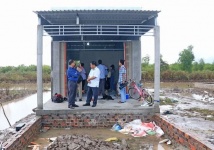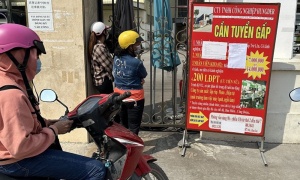A safe and healthy working environment is a fundamental right for every worker
(LĐXH)- To mark World Day for Safety and Health at Work, Ms.Chihoko Asada-Miyakawa, the International Labour Organization’s Regional Director for Asia and the Pacific explains why making safe and healthy working environments a fundamental right for workers matters and what can be done to make this reality.
It’s now ten years since the Rana Plaza building, located in Dhaka, Bangladesh collapsed. That fateful day, at least 1,132 people – mainly garment workers – were killed and more than 2,500 injured.
The disaster seized global attention and led to change. Yet while a major catastrophe such as Rana Plaza captures headlines, accidents and deaths occur in workplaces across every country daily.
In fact, some 2.9 million women and men around the world succumb to work-related accidents or diseases every year; that’s over 8,000 deaths every single day.
The toll is enormous, both in terms of personal tragedy and hardship as well as economic loss.
In June 2022, the International Labour Organization took a historic step when it added a safe and healthy working environment to its Fundamental Principles and Rights at Work..jpg)
Ms.Chihoko Asada-Miyakawa, the International Labour Organization’s Regional Director for Asia and the Pacific
.jpg)
Why does this matter?
It matters because occupational safety and health can now no longer be viewed as an optional extra. All of ILO’s 186 member states are now obligated to respect, promote and achieve a safe and healthy working environment as a fundamental principle and right at work, irrespective of whether they have ratified either of the ILO’s conventions relating to occupational safety and health.
This is significant for several reasons. First and foremost, it recognizes that every worker has the right to be protected from hazards and risks that can cause injury, illness, or death in the workplace.
By making occupational safety and health (OSH) a fundamental right, the ILO is sending a clear message to governments and employers that they must take responsibility for providing a safe and healthy working environment for all workers.
Protecting workers' health and well-being is not just a moral imperative; it makes good business sense too as a recent cost-benefit analysis carried out by the ASEAN Secretariat on OSH in the construction sector showed.
When workers feel safe and healthy in their workplace, they are more likely to be productive and efficient. This can benefit workers, employers as well as the wider economy. Conversely, when workers are injured or become ill due to workplace hazards, it can have a significant negative impact on productivity and economic growth.
Making OSH a fundamental right promotes social justice and equality. This is particularly important for workers in marginalized communities who may be at greater risk of workplace hazards due to factors such as poverty, discrimination, and lack of access to education, training and OSH services.
It is also important in terms of ensuring compliance with OSH regulations and standards which in turn can lead to better working conditions and improved health outcomes for workers.
In Asia and the Pacific, progress on OSH is being made on many fronts. ILO OSH-related conventions have been ratified while there are new national OSH policies, laws and programmes across the region. Steps are being taken to ensure that no one is left behind, with efforts, for example, to reach out to sanitation and waste recycling workers in South Asia and the smallest enterprises and informal economy workers in ASEAN.
Meanwhile, the capacity of labour inspectors – who are on the front-line of efforts to ensure workplaces are safe and healthy - has been boosted through training and the use of technology.
These are all important initiatives, which must be applauded and supported. However, for OSH to become a daily reality for all workers, it must be addressed alongside ILO’s other Fundamental Principles and Rights at Work. These relate to freedom of association and collective bargaining, the elimination of forced and child labour as well as ending discrimination in the world of work.
The participation of both employers and workers through social dialogue and workplace cooperation is vital if a sound culture of prevention in OSH is to be created. Freedom of association and collective bargaining help workers organize and negotiate for better working conditions, including safety and health. Without these rights, workers may be unable to advocate for themselves and may be more vulnerable to exploitation and mistreatment.
Trade unions have an important role to play in this regard, helping voice concerns of workers as well as training them in OSH basics. Meanwhile, enterprise level OSH committees such as those set up in the Indonesian palm oil industry as well the Bangladesh garment sector allow workers and employers to address safety and health issues face to face and as equals.
Forced and child labour as well as discrimination in respect of gender, age, migrant status, employment and occupations are also all intrinsically linked with workplace safety and health. Unless they too are tackled, men, women, the aged, youth and the vulnerable will continue to find themselves toiling in hazardous circumstances, where accidents are commonplace and social protection rare.
A safe and healthy working environment is now a fundamental right for each and every worker. Governments, employers, trade unions as well as companies at every level of the supply chain must work together to make this right a reality.
We can do so through shared commitment, joint efforts and by taking a holistic approach. One which recognises and promotes all fundamental workers’ rights and helps deliver social justice and decent work for all./.
Hong Minh
Tags:
-
 Ca Mau nears 78% completion of substandard housing elimination campaign
17-04-2025 15:12 58
Ca Mau nears 78% completion of substandard housing elimination campaign
17-04-2025 15:12 58 -
 Empowering Vietnamese Policewomen: An International Conference on Strengthening Capacity of Women in Law Enforcement
10-03-2025 15:48 15
Empowering Vietnamese Policewomen: An International Conference on Strengthening Capacity of Women in Law Enforcement
10-03-2025 15:48 15 -
 Over 10,000 women and children in Ninh Thuận and Cà Mau access clean water and better livelihoods
21-02-2025 14:36 01
Over 10,000 women and children in Ninh Thuận and Cà Mau access clean water and better livelihoods
21-02-2025 14:36 01
-
 Establishing a partnership on labour cooperation between Vietnam and Finland
13-01-2025 14:38 30
Establishing a partnership on labour cooperation between Vietnam and Finland
13-01-2025 14:38 30 -
 Many important results in vocational training in Vietnam
07-01-2025 14:13 46
Many important results in vocational training in Vietnam
07-01-2025 14:13 46 -
 9 in 10 Vietnamese consumers say a healthier diet is important to support mental and physical health – Herbalife Asia Pacific survey
26-12-2024 13:52 47
9 in 10 Vietnamese consumers say a healthier diet is important to support mental and physical health – Herbalife Asia Pacific survey
26-12-2024 13:52 47
English Review


Ca Mau nears 78% completion of substandard housing elimination campaign
English Review | 17-04-2025 15:12 58
- Empowering Vietnamese Policewomen: An International Conference on Strengthening Capacity of Women in Law Enforcement
- Over 10,000 women and children in Ninh Thuận and Cà Mau access clean water and better livelihoods
- Promoting labor cooperation between Vietnam and the Province of Saskatchewan (Canada)








